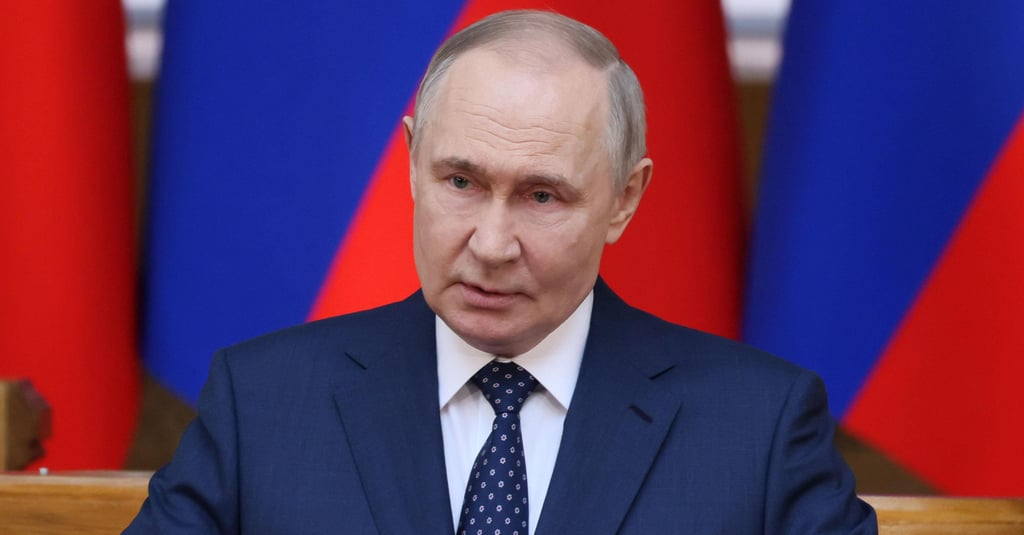Putin’s “Pause for Peace”: The Tactical Shift in Ukraine and Trump's Risky Gamble
New Western intelligence indicates Vladimir Putin may be scaling back short-term goals in Ukraine to consolidate seized territory and court economic relief—potentially setting the stage for a deceptive “peace.” As Trump pushes negotiations, critics warn Russia’s long game remains unchanged.
POLITICSWORLD
CNN
5/2/20253 min read


Emerging Western intelligence assessments suggest that Russian President Vladimir Putin may have recalibrated his immediate war aims in Ukraine—favoring consolidation of existing territorial gains and potential economic recovery over continued military escalation. While this signals a possible shift in tone, many in the West remain deeply skeptical: Is Putin truly seeking peace, or merely pausing to strike harder later?
Multiple sources familiar with recent intelligence briefings tell CNN that Putin’s focus has narrowed, no longer fixated on overtaking all of Ukraine in the near term. Instead, his objectives appear to center around securing Crimea and four other occupied territories, stabilizing Russia’s flailing economy, and engaging with the Trump administration on lucrative post-war incentives—including promises of U.S.-Russia investments if the war ends.
This adjustment has added momentum to the Trump administration’s push for a peace deal, with Vice President JD Vance confirming last week that negotiations are coalescing around a truce near current front lines and possible “territorial swaps.”
Yet senior U.S. and European officials are divided. Many see Putin’s gestures as a strategic feint, not a real pivot.
“Putin’s thinking has evolved because he thinks he has a sympathetic U.S. president who doesn’t know what he’s doing,” said Rep. Jason Crow (D-CO), a member of the House Intelligence Committee. “He thinks there can be a settlement, and it simply won’t be enforced.”
A Dangerous Deal or a Necessary Compromise?
Under the Trump-led negotiations, the proposed framework involves ceding control of Crimea and four other Ukrainian territories to Russia, a move that has alarmed European allies. While Trump and his team view this as a pathway to peace, critics argue it risks setting a dangerous precedent for rewarding aggression and could embolden future Russian expansionism.
“This peace deal is about these so-called five territories. But there’s so much more to it,” Trump said during a Fox News interview after his fourth meeting with Putin. “I think we might be on the verge of something very important for the world at large.”
Putin has long regarded parts of Ukraine as the “cradle of Russian civilization.” Even if he temporarily accepts current lines, officials warn, his strategic ambitions remain unchanged. One senior European diplomat told CNN, “They’re just playing along to win time.”
A Fragile Ceasefire or Just the Eye of the Storm?
U.S. envoy Keith Kellogg claims the administration is simply waiting on Russia to agree to a ceasefire, saying they are “in the last 100 yards” of finalizing an agreement. But recent briefings from U.S. intelligence agencies caution that Putin’s long-term plan still includes controlling more of Ukraine, once global attention fades and his forces regroup.
This aligns with concerns voiced by Sen. Roger Wicker (R-MS), who bluntly warned, “It’s time to treat Putin like the deceptive war criminal he is,” urging the Trump administration not to be “dragged along” by illusions of peace.
Even Trump himself, in a recent Truth Social post, began questioning Putin’s intentions:
“Maybe he doesn’t want to stop the war, he’s just tapping me along,” Trump wrote after a meeting with President Volodymyr Zelensky at the Vatican. He floated the idea of escalating with secondary sanctions or financial pressure instead.
Ukraine’s Plea: Security Guarantees or Bust
Throughout the negotiations, Ukraine has pleaded for binding security guarantees, wary of sacrificing territory without strong deterrents to prevent future aggression. Ukrainian officials insist that recognizing Russian sovereignty in occupied regions is unacceptable, and any peace must be fortified by robust military and economic partnerships.
“The Russian objective is to get as much territory recognized as possible and have as weak of a Ukraine as possible,” said a senior U.S. official involved in negotiations.
Conclusion: A Pause, Not a Peace
If Putin has indeed altered his short-term calculus, it’s not out of goodwill, but necessity: economic pressure, military stagnation, and a more pliable U.S. administration have given him a new opportunity to rebrand defeat as strategic victory.
But if the Trump administration misjudges Putin’s intentions, it may not be brokering peace—it may be buying time for the next war.
Photo: EPA
© 2026. Ke Press Global. A Ke Harbor Company. All rights reserved.
FOLLOW KE PRESS GLOBAL ON :
Contact us


